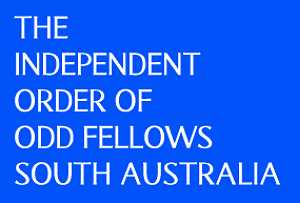|
Philosophy |
Teachings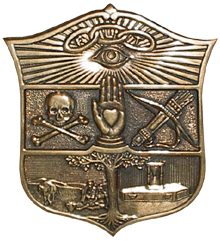 The Independent Order of Odd Fellows endeavours to improve and elevate the
character of members by conferring principles which will aid their
personal development. Teachings in the Order are conducted through the
exemplification of the Degrees of membership.
The Independent Order of Odd Fellows endeavours to improve and elevate the
character of members by conferring principles which will aid their
personal development. Teachings in the Order are conducted through the
exemplification of the Degrees of membership.The Degrees are conferred on the candidate by their Lodge, and are teachings of principles and truths by ceremonies and symbols. The Degrees are presented largely by means of allegory and drama. The Odd Fellow is introduced to universal symbols important to our teachings. A parable is a spoken symbol, and a symbol is a silent parable. All symbols are regarded as derived from a common source of symbolism and are said to scintillate with meaning. |
There are 8 Degrees in the Independent
Order of Odd Fellows.
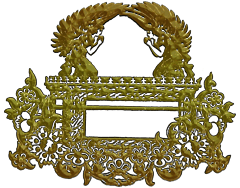 Odd Fellow Lodge Degrees:
Odd Fellow Lodge Degrees:
The Initiatory Degree
The Degree of Friendship (1st Degree)
The Degree of Brotherly Love (2nd Degree)
The Degree of Truth (3rd Degree)
Patriarchal Encampment Degrees:
The Patriarchal Degree
The Golden Rule Degree
The Royal Purple Degree
Rebekah Lodge Degree:
The Rebekah Degree
Custom varies as to the time required between receiving the Degrees,
however it is expected to be only after a member has proven knowledge and
practice in the previous Degree. In Australia one need only wait months,
however, in parts of Europe it can take years to receive all of the
Degrees.
THE REBEKAH DEGREE
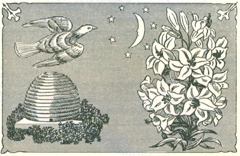 The Rebekah Branch was established in America in 1851 after much
controversy regarding the inclusion of women as Odd Fellow members in the
Order. Largely responsible for its existence was Schuyler Colfax, who
later became a Senator and Vice President of the United States of America.
The Odd Fellows were the first of the major fraternal Orders to provide a
branch for women. Initially conferred only on Third (Scarlet) Degree Odd
Fellows and their wives or widows, the Rebekah Degree was gradually opened
in stages to other female relatives of Odd Fellows. Eventually all women
who met the requirements for membership as stated above were welcome.
The Rebekah Branch was established in America in 1851 after much
controversy regarding the inclusion of women as Odd Fellow members in the
Order. Largely responsible for its existence was Schuyler Colfax, who
later became a Senator and Vice President of the United States of America.
The Odd Fellows were the first of the major fraternal Orders to provide a
branch for women. Initially conferred only on Third (Scarlet) Degree Odd
Fellows and their wives or widows, the Rebekah Degree was gradually opened
in stages to other female relatives of Odd Fellows. Eventually all women
who met the requirements for membership as stated above were welcome.
According to a significant statement in the ceremony of the Rebekah
Degree, the general duties of the members of the Rebekah Lodge is to: “To
live peaceably, to do good unto all, as we have opportunity, and
especially to obey the Golden Rule, ‘Whatsoever ye would that others
should do unto you, do ye even so unto them.’”The meetings of the
Rebekah Degree are always opened and closed with prayer and an open Bible
is always present.
The Rebekah Degree was designed especially for women, and its ceremony and
lectures are based upon the characters of notable women in Biblical
history. It is named for that woman of early Hebrew history whose kindness
and hospitality to a humble and unknown stranger best portrayed the
nobility and character of women. There are also other notable women of
Biblical history whose characters and virtues form the basis for the
Rebekah Degree and lessons of life to be followed by the Rebekahs. They
were famous for their loyalty, patriotism, for civic and national
services, for humanitarianism, and for devotion to God and the cause of
righteousness among mankind.
The Rebekah Degree ceremony is illustrated by distinctive symbols employed in the work of the Degree, each having a beautiful signification and an appropriate application. Through the mission of friendship, love and truth, of charity, tolerance and for-bearance, Sisters of the Rebekah Degree are to strive to bring happiness to others and to promote “Peace on earth and good will to men.”
Odd Fellows may join a Rebekah Lodge if they are qualified. After a man receives the Rebekah Degree, he may participate in Rebekah Lodge meetings, and may speak, vote and hold office in his local Rebekah Lodge.
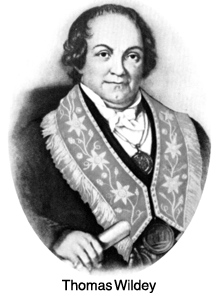 One of the world’s oldest
fraternal Lodges
One of the world’s oldest
fraternal Lodges
The Independent Order of Odd Fellows maintains a structure of Lodges throughout the world which offer members the opportunity to explore new experiences, and appreciate our rich heritage of almost 200 years. In Australia we have Lodges in South Australia, New South Wales, Western Australia and Tasmania. In South Australia we have Lodges in the Adelaide metropolitan area, Murray Bridge and Port Augusta.
Odd Fellowship endeavours to aid the personal development of members through the principles of the teachings which make up our Degree lessons, and through the responsibility of serving in positions of authority within the Lodge.
All Odd Fellows must recognise the universal concept of a “Supreme Being, the creator and preserver of the Universe”, which is a pre-requisite to membership. The fraternity is non-political and non-sectarian. Regardless of race, nationality, politics or religious practice, you are a welcome member. In fact, political and sectarian debate are not allowed at Lodge meetings. Membership in the Odd Fellows provides a rewarding experience for those willing to learn and progress through the levels of membership.

The three links of the logo,
which is over 200 years old, represent the basic Odd Fellow principles of
conduct: Universal Friendship (F) Brotherly and Sisterly Love (L) and
Truth (T) in all matters.
The Universal Vision is:
“To elevate the character of man under the Fatherhood of God and within
the brotherhood of man”
Our Founding Obligation for Members duties is:
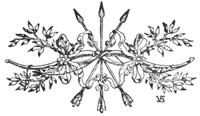
To
visit the sick
Relieve the distressed
Bury the dead.
Educate the orphan.
It is considered that these obligations apply as much today as they did at
the foundation of the Order, but some are now delivered in a manner more
appropriate for the 1990’s through personal financial security for
funerals, and educational opportunities for all members’ children.
Lodges around the world conduct various humanitarian projects to fulfil
these philanthropic tenets.
The exact origin of the Odd Fellow fraternities is unknown. The earliest
written record is in a public museum in Scotland and is a Charter granted
to a “Society of Odd Fellows” under seal dated May 6, 1557.
The Independent Order of Odd Fellows
(IOOF) has its beginning during the 1700’s in England, where the members
of the Order originally earned their name by being workmen of the odd
trades and odd labourers not covered by the original craftsmen’s guilds
who would cater for particular trades.
Through Friendly Societies ordinary people: labourers, miners, carpenters, grouped together and contributed their pennies into the funds of their Lodge which were used to provide some of the essential services their communities lacked. Friendly Societies were democratic, and all decisions were made by majority votes of members. This allowed individual Lodges to provide for needs specific to their immediate community.
The Order was organised in the USA by Thomas Wildey and four other Odd Fellows from England in April 26, 1819. From 1878 the Order became Independent of England and since then it has expanded into other countries.
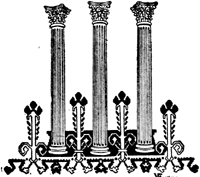 At
the end of the Civil War in the USA the Order was credited with being the
first organisation to publicly show reconciliation between the North and
South by gathering together in joint ceremony. This was in 1865 on
the occasion of the dedication of the monument to Thomas Wildey in
Baltimore. Of the occasion, Andrew Johnson, the President at the time
wrote: “I pray you I rejoice in the reunion of your Order throughout the
United States as an auspicious prestige of the restoration of order and
complete political harmony throughout the Nation.”
At
the end of the Civil War in the USA the Order was credited with being the
first organisation to publicly show reconciliation between the North and
South by gathering together in joint ceremony. This was in 1865 on
the occasion of the dedication of the monument to Thomas Wildey in
Baltimore. Of the occasion, Andrew Johnson, the President at the time
wrote: “I pray you I rejoice in the reunion of your Order throughout the
United States as an auspicious prestige of the restoration of order and
complete political harmony throughout the Nation.”
We are the only fraternal organisation whose presiding officer attended the coronation of Elizabeth II, by invitation; and which is afforded the opportunity to maintain an official observer at all sessions of the United Nations.
We are the only fraternity that has been permitted to confer its highest decoration on the Unknown Soldier in the USA.
Historical Origins of Associations
Ancient Times

History records the existence of secret associations among nearly all the nations of the earth. They have accompanied and been a part of the advancement of civilisations. They have served as the conservators and promoters of religious, scientific and political life.
Associations have their beginnings in ancient cultures where they were a means of passing on teachings to the un-initiated. These teachings included writing, arts and sciences. Associations provided a means of education and training in philosophical matters of conscious human existence. This required both theoretical learning and rituals. The ancient societies where associations originated include the Egyptians, Babylonians, Jews, Greeks, Persians, and other Eastern cultures.
It is difficult to trace teachings of the various Orders as they changed over centuries, and many fanciful stories proliferated the 1800s to this extent, with some Orders tracing themselves to the mystical Egyptian priesthood and even the Knights of the Round Table to name two of the more fanciful myths.
The Old Guilds of England
These reach back to the middle ages, although organisations and clubs proliferated the 7th and 8th centuries in Britain. There are records and manuscripts of more than 100 early guilds in the 4th and 5th century. These organisations of, by and for the people were not subject to the laws of monarchies, and in fact existed in spite of them.
The germ of the “benefit” society comes from the 1300’s where the first “fraternitees” provided a contribution and benefit scheme for members. Members contributed fees to their Lodge, and in turn their Lodge provided basic social services for their families.
The motto of the Independent Order 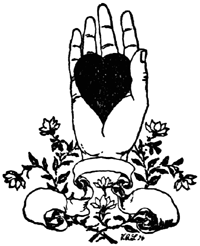 of
Odd Fellows has always been "to elevate the character of mankind
under the Fatherhood of God and within the brotherhood of
man." The Lodge existed for decades as the only source of
security for working families, and provided a crucial social safety net in
times of unregulated labour markets and fledgling government
services. Aside from these essential social services provided to
members, Lodge membership provided a training ground for those of limited
education to learn leadership and organisational skills.
of
Odd Fellows has always been "to elevate the character of mankind
under the Fatherhood of God and within the brotherhood of
man." The Lodge existed for decades as the only source of
security for working families, and provided a crucial social safety net in
times of unregulated labour markets and fledgling government
services. Aside from these essential social services provided to
members, Lodge membership provided a training ground for those of limited
education to learn leadership and organisational skills.

